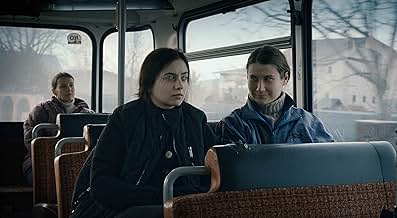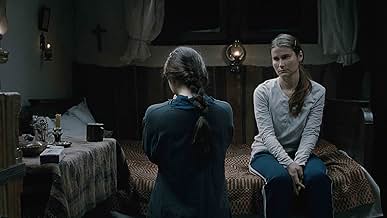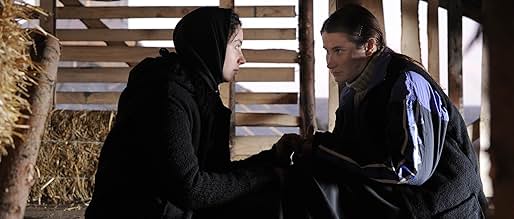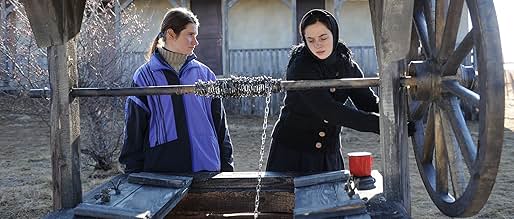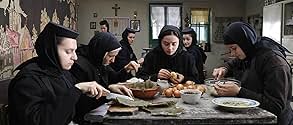ÉVALUATION IMDb
7,5/10
14 k
MA NOTE
L'amitié entre deux jeunes femmes qui ont grandi dans le même orphelinat. L'une trouve refuge dans un couvent en Roumanie et refuse de partir chez son amie, qui vit maintenant en Allemagne.L'amitié entre deux jeunes femmes qui ont grandi dans le même orphelinat. L'une trouve refuge dans un couvent en Roumanie et refuse de partir chez son amie, qui vit maintenant en Allemagne.L'amitié entre deux jeunes femmes qui ont grandi dans le même orphelinat. L'une trouve refuge dans un couvent en Roumanie et refuse de partir chez son amie, qui vit maintenant en Allemagne.
- Director
- Writers
- Stars
- Prix
- 8 victoires et 19 nominations au total
Valeriu Andriuta
- Priest
- (as Valeriu Andriutã)
Avis en vedette
It is a sad story told in a fair way. You see the two characters desperately trying to save each other, but also desperately trying to keep themselves into the "safe bubble" they created around them: Voichita's bubble is the monastery, Alina's bubble is Voichita, the only human being that ever loved her.
It is the story of two girls who grew up in an orphanage (I felt a shiver trying to imagine it) and had few choices at the moment they became adults. The movie lefts many questions open. One of them, the hardest perhaps, is how was it possible that nobody (monastery, hospital, school, foster family, police, etc.) was able to help a girl, while everybody agreed on the fact that she needed help.
It is the story of two girls who grew up in an orphanage (I felt a shiver trying to imagine it) and had few choices at the moment they became adults. The movie lefts many questions open. One of them, the hardest perhaps, is how was it possible that nobody (monastery, hospital, school, foster family, police, etc.) was able to help a girl, while everybody agreed on the fact that she needed help.
A girl visits a convent to try and bring her friend home.
Starring Cosmina Stratan and Cristina Flutur.
Written by Cristian Mungiu. Inspired by the Non Fiction Novels of Tatiana Niculescu Bran.
Directed by Cristian Mungiu.
This is a dark and disturbing movie that would have been far better if it wasn't so slow paced.
It moves at a snails pace but maybe that's what Cristian Mungiu intended, after all I'm guessing that's how things flow in a convent. The story isn't bad and as far as I could tell ( this was a Romanian movie with English subtitles) the acting was okay without being incredible.
I liked the outside location cinematography but the indoor stuff looked a bit wobbly. This is an arty film and usually I like anything like this but for me this was too slow and bordering on boring. For me it lacked something but I'm not sure what. Maybe the relationship between the two main characters could have been explored more to make this more watchable? We only get a few suggestions of a love affair in the past between them both and so perhaps that's what this movie needed.
It does make you think. It's pretty much an anti religious movie and that's the message that came across clearly at the end.
7/10
Starring Cosmina Stratan and Cristina Flutur.
Written by Cristian Mungiu. Inspired by the Non Fiction Novels of Tatiana Niculescu Bran.
Directed by Cristian Mungiu.
This is a dark and disturbing movie that would have been far better if it wasn't so slow paced.
It moves at a snails pace but maybe that's what Cristian Mungiu intended, after all I'm guessing that's how things flow in a convent. The story isn't bad and as far as I could tell ( this was a Romanian movie with English subtitles) the acting was okay without being incredible.
I liked the outside location cinematography but the indoor stuff looked a bit wobbly. This is an arty film and usually I like anything like this but for me this was too slow and bordering on boring. For me it lacked something but I'm not sure what. Maybe the relationship between the two main characters could have been explored more to make this more watchable? We only get a few suggestions of a love affair in the past between them both and so perhaps that's what this movie needed.
It does make you think. It's pretty much an anti religious movie and that's the message that came across clearly at the end.
7/10
A complex story plot describing a tragic division of life paths of two female friends who found themselves either into grinding mill of bigotry in church structures or into that of a cold bureaucratic apparatus. This poetically told story leads us through meditative winter landscapes and dark interiors of the monastery where, besides obvious social issues, one can vaguely discern a disturbing relationship between the two friends consisting of perplexing resignation and self-destruction. The success of this work lies in the abundance of details which bring the audience into contemplation about human nature.
Well,I wanted desperately, not to like, to love this movie... All the premises were there, I couldn't wait for the film to be released... But, as the film was developing in front of my eyes, I was completely feeling less...No attachment to the girls, I didn't even care for one damn second about any of them, the film scratches everything that is supposed to carve upon, the director seems in a hurry to reach something that slips between his fingers...I felt no compassion for that girl, in some moments I was about to scream to her, get out of that place, girl, return to Germany, live your life and put ourselves out of the misery of watching this movie!And one more thing. The performances of both girls, cumulated, multiplied by 100, they never, ever, never ever, are any close to the magnificent performance of Emanuelle Riva in Amour... So , Nanni Moretti, I don't really know what came to your mind when you gave that award to these two, frustrating the beautiful Riva of that super-deserved award
'Based on a true story' – a phrase that can cover so many bases - is the slow-burning and languorous Romanian film Beyond the Hills.
Set predominantly in a monastery in a bleak and poverty-stricken district, it is a complex and multi-layered film revolving around two young women, Alina and Voichita. Previously childhood friends then lovers, their lives intertwine once more when Alina returns from working in Germany in an attempt to once more enter into a relationship with Voichita who has since taken Holy Orders and is living the chaste and extremely frugal life of a nun. The rekindling of the relationship was always doomed and as Alina's mental health deteriorates with the realisation that she will not achieve her objective, she provokes a series of events culminating in the belief by some that she is possessed and needs cleansing.
A Romanian film about faith, despair and unrequited lesbian love in an impoverished monastery was never likely to be an action-packed, sensationalist blockbuster. It is long at 155 minutes and its pace tends to alternate between dead slow and stop. It's the sort of a film which will take over 5 minutes to show a nun leaving the kitchen to draw water from the well and return to the kitchen with no dialogue or plot advancement throughout that period. But it is a film that has the courage to take its time, confident that it can draw you into the lives of the people whose story it tells. And on the whole it succeeds.
There are no real villains or heroes in the film. It does not take the easy route to mock and blame religion for out-dated belief – when a nun believes she has been sent a sign from God and goes all peculiar, the Orthodox Priest in charge cuts down the hysteria curtly and tells her and the other nuns to move on. No, the people shown in this film, be they doctors, police or those of the cloth, are portrayed as well-meaning individuals all looking to do no harm even if, like all of us, they can be judgmental and self-righteous on occasion. Beyond the Hills is an unashamedly bleak and ultimately very sad film which gives no answers but merely records events leaving its audience to draw their own conclusions.
Cinematography was good, though the constant sound of the ever-blowing wind was sometimes crude and off-putting.
And there was an early failure of the sub-titles. When Alina first arrives at the monastery, the camera concentrates on a hand-written sign at its entrance. It's clearly of some import for it to be shown so, but the audience is not let in on its message. Post-film research ascertained it stated, words to the effect: This is the House of God. Forbidden to those of different religion. You must believe and not doubt. It would have explained much.
Set predominantly in a monastery in a bleak and poverty-stricken district, it is a complex and multi-layered film revolving around two young women, Alina and Voichita. Previously childhood friends then lovers, their lives intertwine once more when Alina returns from working in Germany in an attempt to once more enter into a relationship with Voichita who has since taken Holy Orders and is living the chaste and extremely frugal life of a nun. The rekindling of the relationship was always doomed and as Alina's mental health deteriorates with the realisation that she will not achieve her objective, she provokes a series of events culminating in the belief by some that she is possessed and needs cleansing.
A Romanian film about faith, despair and unrequited lesbian love in an impoverished monastery was never likely to be an action-packed, sensationalist blockbuster. It is long at 155 minutes and its pace tends to alternate between dead slow and stop. It's the sort of a film which will take over 5 minutes to show a nun leaving the kitchen to draw water from the well and return to the kitchen with no dialogue or plot advancement throughout that period. But it is a film that has the courage to take its time, confident that it can draw you into the lives of the people whose story it tells. And on the whole it succeeds.
There are no real villains or heroes in the film. It does not take the easy route to mock and blame religion for out-dated belief – when a nun believes she has been sent a sign from God and goes all peculiar, the Orthodox Priest in charge cuts down the hysteria curtly and tells her and the other nuns to move on. No, the people shown in this film, be they doctors, police or those of the cloth, are portrayed as well-meaning individuals all looking to do no harm even if, like all of us, they can be judgmental and self-righteous on occasion. Beyond the Hills is an unashamedly bleak and ultimately very sad film which gives no answers but merely records events leaving its audience to draw their own conclusions.
Cinematography was good, though the constant sound of the ever-blowing wind was sometimes crude and off-putting.
And there was an early failure of the sub-titles. When Alina first arrives at the monastery, the camera concentrates on a hand-written sign at its entrance. It's clearly of some import for it to be shown so, but the audience is not let in on its message. Post-film research ascertained it stated, words to the effect: This is the House of God. Forbidden to those of different religion. You must believe and not doubt. It would have explained much.
Le saviez-vous
- AnecdotesFilmed and edited simultaneously in chronological order.
- ConnexionsFeatured in At the Movies: Cannes Film Festival 2012 (2012)
Meilleurs choix
Connectez-vous pour évaluer et surveiller les recommandations personnalisées
- How long is Beyond the Hills?Propulsé par Alexa
- This is a Russian production?
Détails
- Date de sortie
- Pays d’origine
- Sites officiels
- Langue
- Aussi connu sous le nom de
- Beyond the Hills
- Lieux de tournage
- Campina, Roumanie(location)
- sociétés de production
- Consultez plus de crédits d'entreprise sur IMDbPro
Box-office
- Brut – États-Unis et Canada
- 124 919 $ US
- Fin de semaine d'ouverture – États-Unis et Canada
- 14 622 $ US
- 10 mars 2013
- Brut – à l'échelle mondiale
- 673 493 $ US
- Durée2 heures 32 minutes
- Couleur
- Mixage
- Rapport de forme
- 2.35 : 1
Contribuer à cette page
Suggérer une modification ou ajouter du contenu manquant

Lacune principale
By what name was Au-delà des collines (2012) officially released in India in English?
Répondre

